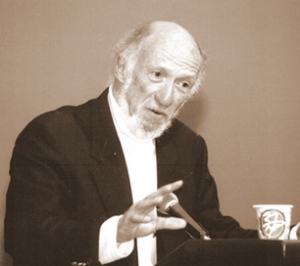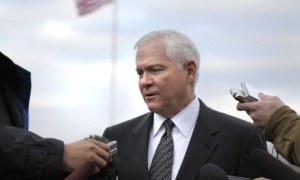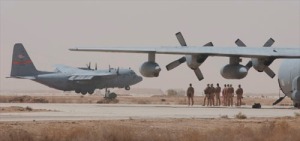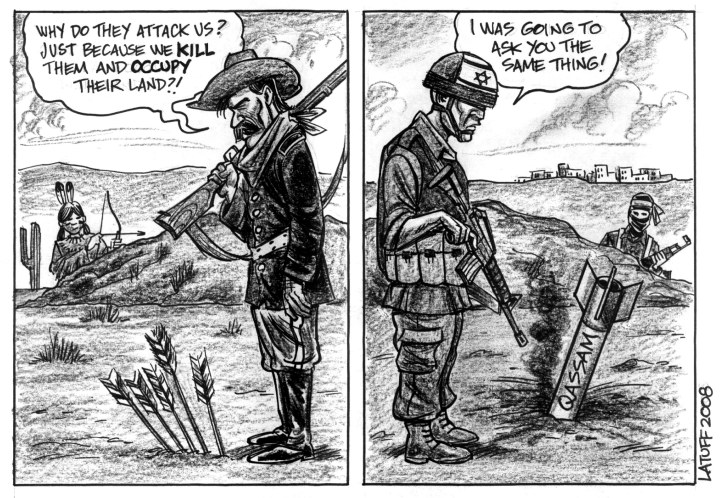Iran to Obama: Change in words not enough
In a video message to Iran delivered to coincide with the spring holiday of Nowruz, U.S. President Barack Obama may have departed significantly from Bush-era policies by opening the door to constructive dialog between the two nations. But his overtures disappointed many and were less than warmly received by the government in Tehran largely because they seemed to embody a continuation of carrot-and-stick diplomacy oriented toward rewarding a sovereign nation for “good behavior” rather than truly engaging it as an equal.
The BBC reports on the response from Supreme Leader Ayatollah Khomeini:
Speaking to a large crowd in the holy city of Mashhad, Ayatollah Khamenei said Iran had “no experience with the new American government and the new American president.”
“We will observe them and we will judge,” he said.
“If you change your attitude, we will change our attitude.”
In the speech, which was carried live by Iranian television, he said Iran was yet to see such a change.
“What is the change in your policy?” he asked.
“Did you remove the sanctions? Did you stop supporting the Zionist regime? Tell us what you have changed. Change only in words is not enough.”
Matters were not helped, perhaps, in that Obama preceded his address by extending certain sanctions against the Islamic republic for one year, citing threats to U.S. national security.
Iran is due to hold presidential elections this summer. Former President Mohammed Khatami, a figure widely viewed as more open to reconciliation with the West, was at one point slated to run for reelection but then withdrew from the race. Whether or not current President Amahdinejad, seen as a foreign policy hardliner, is ousted from office, the U.S. and Israel need not expect the election to bring any major changes to the political climate.
It is good that the new White House is willing to engage in dialog with Tehran, but the fact remains that, if the U.S. wishes genuinely to create goodwill and a sense of cooperation with Iran, it must itself take steps toward enacting several policy changes:
- First and foremost, the U.S. must openly rethink its complete and unmitigated support for the government of Israel, particularly as it pertains to the occupation of the Palestinian territories. Since the U.S. is largely responsible for the arming and funding of Israeli military operations, and has traditionally backed Israel diplomatically against all odds, it is seen as a de facto partner in the blockades and military offensives which have recently crushed millions of innocent Palestinians in response to rocket fire from a relatively small number of militants. The U.S. could help matters by intensifying its commitment to a political solution for Palestine.
- The U.S. must recognize Iran’s right to develop peaceful nuclear energy, and must adopt a policy of “innocent until proven guilty” towards its suspicions that Iran might be seeking to develop nuclear weapons. There remains no concrete evidence that Iran is working towards a bomb, but the hysteria over the idea continues to mount as Israel considers using missiles to destroy enrichment efforts. Iran may be willing to accept reliance on fuel enriched outside its borders, but not for nothing in return.
- The U.S. must work to end U.S. and U.N. sanctions against Iran. This could be made dependent on eliciting cooperation from Tehran on security issues in Iraq and Afghanistan, which the government may or may not be willing to give. But as long as such sanctions are in place, Iran is justified in feeling that it is being addressed as less than an equal, and little progress is likely.
In return, the U.S. should expect Iran to soften its support of Hezbollah and Hamas, to tone down its anti-Israeli rhetoric and provocative missile tests, and to become more receptive to cooperation in Iraq and Afghanistan. But, to keep realism on the table, we must remember that Iran reasonably views itself as a state under threat, surrounded on both sides by ongoing U.S. military operations and continually threatened by talk of missile attacks from Israel.
Obama’s latest move certainly signifies the hope of change, but it is not yet, for many, change we can believe in.
Israel Declares ‘Ceasefire’
Citing that its objectives “and more” have been met over the course of its three-week offensive in Gaza, Israel has declared an end to military action in the Gaza strip which is currently thought to have claimed more than 1,000 Palestinian lives in addition to a much smaller number of Israeli casualties.
The BBC reports:
The Israeli prime minister’s announcement came in a televised address following a late-night cabinet meeting.
Israel’s “goals have been achieved, and even more”, Mr Olmert said, with Hamas badly damaged both militarily and in terms of infrastructure.
But the success of the ceasefire depended on Hamas, he said. If militant rocket fire into Israel continued, Israel would return to force, he said.
How Hamas responds remains to be seen.
The group says any ceasefire must involve Israeli troops withdrawing from Gaza and an immediate lifting of the Israeli blockade.
It has been widely speculated that Israel would halt its incursion before the inauguration of a new U.S. President, since it is roundly understood—and of course denied by the Israeli government—that the support of the White House is a crucial factor in such actions. And Israeli officials know all too well that, regardless of whether or not their stated objectives have been achieved, the appeal of Hamas as a retaliatory vehicle for disenfranchised, ravaged Palestinians has been no more than temporarily shaken and, on the long term, probably vastly deepened. In light of that basic reality, one must ask what the real objectives of the assault have been. It is likely that they had little if anything to do with sporadic rocket fire and much more to do with inflicting the maximum amount of pain and suffering while the time was ripe.
Dear World . . . Sincerely, Palestine
The Heathlander recently posted links to annual reports by various human rights organizations to the United Nations Human Rights Council’s Universal Periodic Review concerning the situation in the Occupied Palestinian Territories (OPT). The article which includes the links represents the views of Richard Falk, a UN human rights investigator recently relieved of his position because of his “hostile views” toward Israel. The findings of a few of these reports are summarized below.
The State of Israel was founded in 1948, carved chiefly out of what had been colonial possessions of the United Kingdom. While many support the existence of a Jewish homeland, particularly in the wake of the events of the Second World War, fewer agree that these particular lands should have been ceded to the control of relatively new Zionist immigrants rather than to the Palestinian ethnic groups which had resided there for centuries. The Zionist settlers believed that they enjoyed a religious “right of return” to the area according to scripture, a controversial notion which, even where accepted, is not generally held to entail such brutal disregard for the sovereignty and basic human dignity of Palestinians.
Since 1967, Israel has occupied lands which were ceded to the Palestinians under a U.N. agreement, pursuing what many feel are policies of expansion, oppression, and apartheid against Palestinians. Additionally, Israel, which possesses without acknowledgment the sole known nuclear arsenal in the region, continues to threaten other surrounding powers—particularly Iran—which have criticized its occupation of Palestinian lands and cruel treatment of Palestinians. At one point or another, it has occupied lands belonging to all of its Arab neighbors; yet the Israeli government continually represents itself as an innocent victim of anti-Semitic violence, refusing to acknowledge that such violence, while unfortunate and deplorable, represents desperate guerrilla-type self-defense on the part of the disenfranchised Palestinians.
 In 2006, Hamas, frequently described as an “Islamic militant” or “terrorist” organization due to its sponsorship of guerrilla activities against the Israeli military and some civilians, won free elections in Gaza. Since then Israel has aggressively boycotted the government in Gaza using blockades, military incursions, and other harmful and violent means which amount to collective punishment of Gaza’s 1.5 million citizens. The West Bank, in contrast, is now presided over by a U.S.-backed government.
In 2006, Hamas, frequently described as an “Islamic militant” or “terrorist” organization due to its sponsorship of guerrilla activities against the Israeli military and some civilians, won free elections in Gaza. Since then Israel has aggressively boycotted the government in Gaza using blockades, military incursions, and other harmful and violent means which amount to collective punishment of Gaza’s 1.5 million citizens. The West Bank, in contrast, is now presided over by a U.S.-backed government.
The United Nations has, on too many occasions to count, reprimanded Israel and called for an end to these atrocities. Such proceedings are routinely boycotted by Israel, the United States, and sometimes a few other member states, while being overwhelmingly supported by the majority of the international community. The United States provides billions of dollars in financial and military aid to Israel annually, and is characteristically quick to defend Israeli hegemony and expansionism in the region in the name of self-defense.
The following are direct or paraphrased excerpts of just a few of the many 2008 reports to the UNHRC concerning conditions in Palestine. For the full set of reports, visit this page. These documents represent merely the latest additions to a huge book detailing many of the atrocities visited against the Palestinian people according to a pattern of U.S.-sanctioned abuse which stretches back for decades.
Jeff Halper on Obama and the Israel-Palestine conflict
From Counterpunch, an article by Jeff Halper of the Israeli Committee Against House Demolitions which sums up nicely the need for Israel to take responsibility for the 60-year-old refugee situation, and what incoming U.S. President Obama could do to help bring peace to the region:
Addressing the Israeli-Palestinian conflict is an urgent priority. It is a conflict with global ramifications in a part of the world crucial to Western, and especially American, political and economic interests. The Israeli Occupation fuels anger and alienation among Muslims – as well as among peoples beyond the Muslim world, including in Europe – towards the US and its European allies. And the Palestinians are the gatekeepers that cannot be by-passed. No matter what peace plan is devised or how much pressure is exerted on the Palestinian leadership to accept it, until the Palestinian people everywhere, including the refugee camps, say that the conflict is in fact over, it’s not over. This is their ultimate clout. Only when a just solution is reached that genuinely addresses their grievances and needs will they signal to the rest of the Arab and Muslim worlds that the time has come to normalize relations with Israel and its American and Western patrons. This reality is obliquely acknowledged by Scowcroft and Brzezinski when they write: “Not everyone in the Middle East views the Palestinian issue as the greatest regional challenge, but the deep sense of injustice it stimulates is genuine and pervasive.”
Yet every peace initiative since 1967 has been stymied – let’s be honest – by Israel’s determination to make permanent its control of the land “between the river and the sea.” Why compromise if you can have it all? Israelis today enjoy a high degree of security (Gaza being little more than a nuisance), the settlement project proceeds unhindered, the economy (based on diamonds, arms and security) is sound and their country’s international status only rises. The status quo, far better, more predictable and more manageable than any “peace” might be, can be maintained indefinitely, especially given US support which, because of the bipartisan support Israel enjoys in Congress, does not seem threatened by the incoming Obama Administration. The problem is framing. However much Israel undermines what would otherwise be a straightforward negotiating process, it cannot be publicly criticized lest one appears to be “anti-Israel” – or worse. And non-critical engagement with Israel has never succeeded in eliciting a single meaningful concession.
Israel expels UN human rights investigator for ‘hostile position’ towards Israel

Prof. Falk
The New York Times reports that the State of Israel expelled on Monday Richard Falk, a United Nations investigator of human rights in the Palestinian territories, citing his “vehement publications” criticizing Israel for committing gross human rights abuses in its treatment of Palestinians, particularly in Gaza.
Falk, a Princeton professor of international law and the UN Human Rights Council special rapporteur for the Palestinian Territories, has come under scrutiny in Israel for calling the Gaza blockade a “crime against humanity” while offering only “cursory” reprimands to the Palestinian militants who dare attempt to defend themselves against decades of colonialist aggression and oppression in their own homeland.
He has compared Israel’s treatment of the Palestinians to Nazi atrocities and has called for more serious examination of the conspiracy theories surrounding the Sept. 11 attacks. Pointing to discrepancies between the official version of events and other versions, he recently wrote that “only willful ignorance can maintain that the 9/11 narrative should be treated as a closed book.”
In his capacity as a United Nations investigator, Mr. Falk issued a statement this month describing Israel’s embargo on Gaza, which is controlled by Hamas, as a crime against humanity, while making only cursory reference to Hamas’s rocket attacks against Israeli civilian centers. Israeli officials expressed outrage.
When his appointment was announced by the Human Rights Council last spring, the Israeli representative said it was “impossible to believe that out of a list of 184 potential candidates,” the members had made “the best possible choice for the post.”
The American and Canadian representatives also expressed concerns about Mr. Falk’s possible bias. The Palestinian representative said it was curious that Israel was “campaigning against a Jewish professor” and called the nomination “a victory for good sense and human rights.” Israel objects to the mandate of the special rapporteur on grounds that it ignores all human rights violations by Palestinians, either against Israelis or against other Palestinians. More specifically, it objects to Mr. Falk.
But Jessica Montell, director of Israeli human rights organization B’Tselem, countered that, even if Israel has legitimate concerns about Falk’s objectivity, expelling him in this manner is “an act unbefitting of democracy.”
Israel has shown a marked preference for the Washington-backed government of Mahmoud Abbas, while harshly punishing Palestinians in Gaza for their free election of a Hamas-controlled administration. Yet the Israeli government continues to portray itself as a neutral, objective party, insisting that ad hoc guerrilla attacks against its territory and citizens are acts of aggression rather than protest and defense.
Heedless of copious outcry among the international community and continual denouncement by the United Nations, Israel has occupied Palestinian territory for more than forty years, largely with the support of the United States, the United Kingdom, and other Western governments, claiming a divine right to the land according to religious scripture through the Zionist movement, not to be confused with the faith of Judaism itself.
‘Endgame’ in Iraq? And what game would that be, exactly?

U.S. Defense Secy. Robert Gates
BBC News reports that U.S. Defense Secretary Robert Gates, slated to keep his post after Obama takes office in January, has told U.S. troops on an airbase in Iraq that their mission is in its ‘endgame’:
Mr Gates said the US military presence would undergo a “significant change of mission” next June when troops are due to withdraw from Iraq’s urban areas.
Under a recently agreed deal between the two countries, US troops will completely withdraw from Iraq by 2011.
However, the US general leading US troops in Iraq has said he expects some soldiers to stay in cities beyond June.
The Iraqi parliament voted in favour of the new security deal with the Americans last month. Iraq’s government has hailed the agreement as the prelude to the return of full sovereignty to the country.
Not that this is the first time we’ve heard such talk, of course. But this time, Pentagon officials may actually be speaking from their icy black hearts.
Commanders on the ground in Iraq expect to restore native control to all 18 Iraqi provinces by June, under the terms of a new security deal with the government of Prime Minister Maliki. U.S. voters will expect incoming president Barack Obama to deliver on his promises of a deliberate but expeditious withdrawal from Iraq.
But it isn’t all campaign politics; the simple truth is that, while automakers badger the U.S. Congress for a handout of a few billion dollars, the staggering financial costs of the occupation of Iraq—in the hundreds of billions per annum—continue to create debt and leave federal and industrial resources ever more tightly stretched. The presence of 150,000 troops in Iraq is edging towards the logistically untenable, and recent developments have created an environment in which withdrawal on Washington’s terms is becoming more opportune.
In October, the Iraqi government officially opened its oil reserves—the third-largest proven reserves in the world—to dozens of foreign investors, under the terms of an ownership contract which was never made public. Crude oil prices have recently plummeted in the wake of decreased demand, but with the hands of international oil companies on the spickets in the petroleum paradise of southern Iraq, OPEC is now largely unable to effectively counter in many markets. Critics of the U.S. administration have long maintained that gaining the ability to exert this kind of pressure on oil markets, from the Middle East to Venezuela, has always been a primary goal of the occupation of Iraq.
 Another important prerequisite for withdrawal which is now a fait accompli is the establishment of a series of ‘megabases’ throughout Iraq, including some of the largest such facilities anywhere on the globe. TomDispatch reports:
Another important prerequisite for withdrawal which is now a fait accompli is the establishment of a series of ‘megabases’ throughout Iraq, including some of the largest such facilities anywhere on the globe. TomDispatch reports:
By now, billions have evidently gone into single massive mega-bases like the U.S. air base at Balad, about 60 miles north of Baghdad. It’s a “16-square-mile fortress,” housing perhaps 40,000 U.S. troops, contractors, special ops types, and Defense Department employees. As the Washington Post’s Tom Ricks, who visited Balad back in 2006, pointed out — in a rare piece on one of our mega-bases — it’s essentially “a small American town smack in the middle of the most hostile part of Iraq.” Back then, air traffic at the base was already being compared to Chicago’s O’Hare International or London’s Heathrow — and keep in mind that Balad has been steadily upgraded ever since to support an “air surge” that, unlike the President’s 2007 “surge” of 30,000 ground troops, has yet to end. . .
. . .Think of this as the greatest American story of these years never told — or more accurately, since there have been a few reports on a couple of these mega-bases — never shown. After all, what an epic of construction this has been, as the Pentagon built a series of fortified American towns, each some 15 to 20 miles around, with many of the amenities of home, including big name fast-food franchises, PXes, and the like, in a hostile land in the midst of war and occupation. In terms of troops, the President may only have put his “surge” strategy into play in January 2007, but his Pentagon has been “surging” on base construction since April 2003.
Aside from providing a bottomless boon to salivating contractors, these airbases ensure that, even with the vast majority of manpower extracted from the region, the U.S. can continue to project its power into the Middle East to protect its diplomatic and economic interests. This sends a strong message to the re-emerging Russian Federation as well as to regional powers such as Iran.
So while it may be true that the official U.S. mission in Iraq is coming to a close, in the sense of realpolitik, the ‘game’ may be just beginning.
Illegal Immigration, Part Two
Another variation on the same theme:

“In our every deliberation, we must consider the impact of our decisions on the next seven generations.”
– Great Law of the Iroquois Confederacy
“Nationalism is an infantile disease. It is the measles of mankind.”
– Albert Einstein
“Daddy, Why Are There Wars?”
“Because some people are just plain evil, m’boy! Just plain evil.” Yuk, yuk; yeah, we know. That’s it. It’s Luke Skywalker and Darth Vader, all the time.
Try economics.
Sometimes, nothing obviates further elucidation of the already disturbingly apparent like a good infographic. From Foreign Policy magazine, for instance, via this site, is a columnar graph illustrating the daily consumption of oil in the United States and in various other countries of the world, and another graph showing average fill-up prices in various countries:

Focus Group Markets Belligerent Language against Iran
99 has birthed another cow, and with good reason.
From Mother Jones’ Washington Dispatch:
Laura Sonnenmark is a focus group regular. “I’ve been asked to talk about orange juice, cell phone service, furniture,” the Fairfax County, Virginia-based children’s book author and Democratic Party volunteer says. But when she was called by a focus group organizer for a prospective assignment earlier this month, she was told the questions this time would be about something “political.”
On November 1, she went to the offices of Martin Focus Groups in Alexandria, Virginia, knowing she would be paid $150 for two hours of her time. After joining a half dozen other women in a conference room, she discovered that she had been called in for what seemed an unusual assignment: to help test-market language that could be used to sell military action against Iran to the American public. “The whole basis of the whole thing was, ‘we’re going to go into Iran and what do we have to do to get you guys to along with it?” says Sonnenmark, 49.
Soon after the leader of the focus group began the discussion, according to Sonnenmark, he directed the conversation toward recent tensions between Iran and the United States. “He was asking questions about [Iranian president Mahmoud] Ahmadinejad going to speak at Columbia University, how terrible it was that he was able to go to Columbia and was invited,” Sonnenmark says. “And he used lots of catch phrases, like ‘victory’ and ‘failure is not an option.'”
. . .
“Of all the focus groups I’ve ever been to,” Sonnenmark wrote in a subsequent email to a group of fellow volunteers for the 2006 Senate campaign of Jim Webb, “I’ve never seen a moderator who was so persistent in manipulating and leading the participants.” (Webb is lead author of a Senate letter warning President Bush not to attack Iran without congressional approval; see here and here.)) The gist of the event was “anti-Iranian,” says Sonnenmark.
If the group’s organizers were testing the case for military action against Iran—even as a last resort—Sonnenmark believes they could not have been encouraged by the results of this focus group. “I got the general feeling that George Bush didn’t have a shot in hell” of winning public support for an Iran attack, she says. Some members of her group suggested that if Hillary Clinton were elected president she might have more credibility in making such a case. As for the possibility of an Israeli attack on Iran, Sonnenmark’s impression was that the group’s members did not believe it was up to them to judge.














1 comment